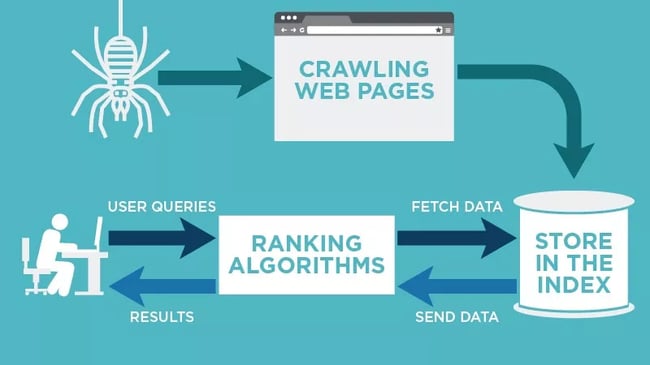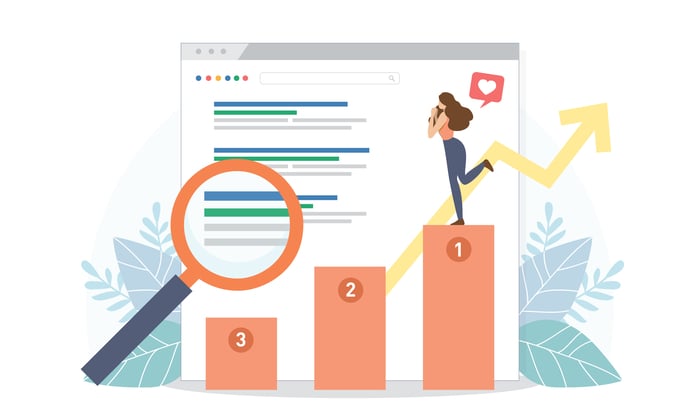Google’s ranking: Search algorithms look at many factors and signals to provide you with the most relevant information. These factors include the words of your query, the relevance and usability of pages, and the expertise of sources. Each factor is weighted differently based on the query.
Google ranking Factors
Google ranking uses web crawlers to index and rank websites. According to Google, every page is rated according to its authority and utility. Google then sorts the search results based on an algorithm based on more than 210 factors.

The higher you appear in Google’s search results for a given search query for Google ranking, the more relevant and authoritative you are.
Specific search queries are answered by search results pages based on keywords and phrases. As Google’s AI learns the meaning behind each query, it processes them in terms of concepts rather than just words. The Natural Language Processing algorithm works on Google’s ranking similarly to how we humans understand and process language.
Read Also: These Benefits of the Digital Marketing Course will help you in 2022
However, to say that’s the end of the story is unfair. We established that your ranking is influenced by more than 210 factors.
We now understand and know many of the factors that determine your Google ranking. Some of them, however, remain a mystery. Google’s Artificial Intelligence algorithms also create and adjust some ranking factors.
The task of understanding how Google ranking thinks might seem impossible at first. Fortunately, there are some clear and sure things you can do to improve your search engine ranking.

An overview of how Google ranking results are generated automatically
If you didn’t have some help sorting through the vast amount of information available, finding what you’re looking for would be nearly impossible. Our ranking systems sort through hundreds of billions of pages in our Search index to present the most relevant, useful results in a fraction of a second.
How you achieve your results depends on the following Google ranking factors
To provide you with the most useful information about Google ranking, search algorithms consider a variety of factors and signals. These include the words in your query, the relevance and usability of pages, the expertise of sources, and your location and settings. Depending on the nature of your query, each factor receives a different weight. When answering queries about current news topics, the freshness of content is more relevant than dictionary definitions.
Here are some key Google ranking factors that influence the results your query returns:
First, we need to understand what you’re looking for – the intent behind your search. As a result, we build language models to extract relevant content based on the few words you type into the search box.
This involves steps for Google ranking as simple as recognising and correcting spelling errors. It extends to utilizing our sophisticated synonym system to find relevant documents even if they don’t contain the exact words that you used. In this case, the manufacturer may have written ‘adjust laptop brightness’ instead of ‘change laptop brightness’. Our systems recognize that words and intent have a relationship, so they connect you to the right content. After over five years of development, this system significantly improves results in over 30% of searches across languages.
Additionally, our systems attempt to determine what type of information you are seeking for Google ranking. Depending on your search query, our systems may show recipes or images if you use words like ‘cooking’ or ‘pictures’. Most results will be displayed in French if you search in that language, since it is likely that’s what you are looking for. Moreover, our systems can recognize that many queries have a local intent, so when you search for ‘pizza,’ you get results about nearby pizza shops.
Our systems understand that up-to-date information may be more useful if you search for trending keywords. When you search for sports scores, company earnings or anything else, you’ll get the most up-to-date information.
The relevance of the content for Google ranking

After analyzing the content, our systems determine whether it contains relevant information.
In order for information to be relevant, it must contain the same keywords as your search query. A web page might be more relevant if those keywords appear in the headings or body of the text.
Besides looking at keywords, our systems analyze content in other ways to determine relevance. Search results are also evaluated based on aggregated and anonymized interaction data. By transforming that data into signals, our machine-learning systems can better estimate relevance. It’s likely you don’t want to see a page with hundreds of references to ‘dogs’ when you search for them. As a result, algorithms determine whether a page contains additional relevant content beyond the keyword ‘dogs’ – such as pictures, videos, or even breed descriptions.
Although our systems do look for these kinds of quantifiable signals to assess relevance, they are not designed to analyse subjective concepts such as political leaning or viewpoint.
Content quality for Google Ranking

After identifying relevant content, our systems prioritize those that appear most helpful. In order to achieve this, they identify signals that indicate what content is authoritative, trustworthy, and demonstrates expertise.
As an example, we use a number of factors to determine this, such as knowing if other prominent websites link to the content. The fact that this information has often been trusted in the past is a positive sign. Our Search quality evaluation process uses aggregated feedback to refine how our systems determine information quality.
As content on the web and the broader information ecosystem changes, we continually measure and assess the quality of our systems to make sure we’re maintaining the right balance between relevance and authority to maintain your trust.
Web page usability for Google’s ranking

We also consider the usability of content when designing our systems. It is likely that content that is more accessible will perform better when all else is equal.
For example, our systems would consider aspects of page experience, such as whether content is mobile-friendly, so that users can view it easily on their portable devices. Similarly, they check that content loads quickly, which is also imperative for mobile users.
With information such as your location, past Search history, and search settings, we can ensure that your results are relevant and useful at the time you need them.
Content relevant to your area is delivered based on your country and location. When you search for ‘football’ in Chicago, Google will most likely show you results about American football and the Chicago Bears. Google will show results about football and the Premier League if you search for ‘football’ in London. Additionally, search settings can indicate which results you’re likely to find useful, such as setting a preferred language or opting into Safe Search (a tool that helps filter out explicit results).
In addition to personalizing results based on your Google Account activity, Google Search also includes a few other features. Google may tailor some recommendations based on your search for ‘events near me’, for example.
| Click Here | |
| Website | Click Here |




